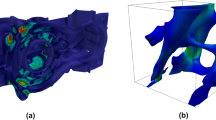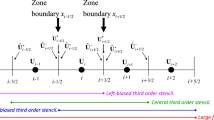Abstract
High-order discretizations of partial differential equations (PDEs) necessitate high-order time integration schemes capable of handling both stiff and nonstiff operators in an efficient manner. Implicit-explicit (IMEX) integration based on general linear methods (GLMs) offers an attractive solution due to their high stage and method order, as well as excellent stability properties. The IMEX characteristic allows stiff terms to be treated implicitly and nonstiff terms to be efficiently integrated explicitly. This work develops two systematic approaches for the development of IMEX GLMs of arbitrary order with stages that can be solved in parallel. The first approach is based on diagonally implicit multi-stage integration methods (DIMSIMs) of types 3 and 4. The second is a parallel generalization of IMEX Euler and has the interesting feature that the linear stability is independent of the order of accuracy. Numerical experiments confirm the theoretical rates of convergence and reveal that the new schemes are more efficient than serial IMEX GLMs and IMEX Runge–Kutta methods.




Similar content being viewed by others
References
Alnæs, M.S., Blechta, J., Hake, J., Johansson, A., Kehlet, B., Logg, A., Richardson, C., Ring, J., Rognes, M.E., Wells, G.N.: The FEniCS project version 1.5. Arch. Numer. Softw. 3(100), 9–23 (2015). https://doi.org/10.11588/ans.2015.100.20553
Ascher, U.M., Ruuth, S.J., Spiteri, R.J.: Implicit-explicit Runge–Kutta methods for time-dependent partial differential equations. Appl. Numer. Math. 25(2/3), 151–167 (1997)
Ascher, U.M., Ruuth, S.J., Wetton, B.T.: Implicit-explicit methods for time-dependent partial differential equations. SIAM J. Numer. Anal. 32(3), 797–823 (1995)
Boscarino, S., Russo, G.: On a class of uniformly accurate IMEX Runge–Kutta schemes and applications to hyperbolic systems with relaxation. SIAM J. Sci. Comput. 31(3), 1926–1945 (2009)
Braś, M., Cardone, A., Jackiewicz, Z., Pierzchała, P.: Error propagation for implicit-explicit general linear methods. Appl. Numer. Math. 131, 207–231 (2018). https://doi.org/10.1016/j.apnum.2018.05.004
Braś, M., Izzo, G., Jackiewicz, Z.: Accurate implicit-explicit general linear methods with inherent Runge–Kutta stability. J. Sci. Comput. 70(3), 1105–1143 (2017)
Butcher, J.C.: Diagonally-implicit multi-stage integration methods. Appl. Numer. Math. 11(5), 347–363 (1993)
Butcher, J.C.: General linear methods for the parallel solution of ordinary differential equations. In: Contributions in Numerical Mathematics, pp. 99–111. World Scientific, Singapore (1993)
Butcher, J.C.: Order and stability of parallel methods for stiff problems. Adv. Computat. Math. 7(1/2), 79–96 (1997)
Butcher, J.C., Chartier, P.: Parallel general linear methods for stiff ordinary differential and differential algebraic equations. Appl. Numer. Math. 17(3), 213–222 (1995). https://doi.org/10.1016/0168-9274(95)00029-T
Califano, G., Izzo, G., Jackiewicz, Z.: Starting procedures for general linear methods. Appl. Numer. Math. 120, 165–175 (2017). https://doi.org/10.1016/J.APNUM.2017.05.009
Cardone, A., Jackiewicz, Z., Sandu, A., Zhang, H.: Extrapolated IMEX Runge–Kutta methods. Math. Model. Anal. 19(2), 18–43 (2014). https://doi.org/10.3846/13926292.2014.892903
Cardone, A., Jackiewicz, Z., Sandu, A., Zhang, H.: Extrapolation-based implicit-explicit general linear methods. Numer. Algorithms 65(3), 377–399 (2014). https://doi.org/10.1007/s11075-013-9759-y
Cardone, A., Jackiewicz, Z., Sandu, A., Zhang, H.: Construction of highly stable implicit-explicit general linear methods. In: AIMS proceedings, vol. 2015. Dynamical Systems, Differential Equations, and Applications, pp. 185–194. Madrid, Spain (2015). https://doi.org/10.3934/proc.2015.0185
Computational Science Laboratory: ODE test problems (2020). https://github.com/ComputationalScienceLaboratory/ODE-Test-Problems
Connors, J.M., Miloua, A.: Partitioned time discretization for parallel solution of coupled ODE systems. BIT Numer. Math. 51(2), 253–273 (2011). https://doi.org/10.1007/s10543-010-0295-z
Constantinescu, E., Sandu, A.: Extrapolated implicit-explicit time stepping. SIAM J. Sci. Comput. 31(6), 4452–4477 (2010). https://doi.org/10.1137/080732833
Ditkowski, A., Gottlieb, S., Grant, Z.J.: IMEX error inhibiting schemes with post-processing. arXiv:1912.10027 (2019)
Frank, J., Hundsdorfer, W., Verwer, J.: On the stability of implicit-explicit linear multistep methods. Appl. Numer. Math. 25(2/3), 193–205 (1997)
Hairer, E., Wanner, G.: Solving ordinary differential equations II: stiff and differential-algebraic problems, 2 edn. No. 14. In: Springer Series in Computational Mathematics. Springer, Berlin (1996)
Hundsdorfer, W., Ruuth, S.J.: IMEX extensions of linear multistep methods with general monotonicity and boundedness properties. J. Comput. Phys. 225(2), 2016–2042 (2007)
Izzo, G., Jackiewicz, Z.: Transformed implicit-explicit DIMSIMs with strong stability preserving explicit part. Numer. Algorithms 81(4), 1343–1359 (2019)
Jackiewicz, Z.: General Linear Methods for Ordinary Differential Equations. Wiley, Amsterdam (2009)
Jackiewicz, Z., Mittelmann, H.: Construction of IMEX DIMSIMs of high order and stage order. Appl. Numer. Math. 121, 234–248 (2017). https://doi.org/10.1016/j.apnum.2017.07.004
Kennedy, C.A., Carpenter, M.H.: Additive Runge–Kutta schemes for convection-diffusion-reaction equations. Appl. Numer. Math. 44(1/2), 139–181 (2003). https://doi.org/10.1016/S0168-9274(02)00138-1
Kennedy, C.A., Carpenter, M.H.: Higher-order additive Runge–Kutta schemes for ordinary differential equations. Appl. Numer. Math. 136, 183–205 (2019). https://doi.org/10.1016/j.apnum.2018.10.007
Lang, J., Hundsdorfer, W.: Extrapolation-based implicit-explicit peer methods with optimised stability regions. J. Comput. Phys. 337, 203–215 (2017)
Pareschi, L., Russo, G.: Implicit-explicit Runge–Kutta schemes and applications to hyperbolic systems with relaxation. J. Sci. Comput. 25(1), 129–155 (2005)
Roberts, S., Popov, A.A., Sandu, A.: ODE test problems: a MATLAB suite of initial value problems (2019). arXiv:1901.04098
Sarshar, A., Roberts, S., Sandu, A.: Alternating directions implicit integration in a general linear method framework. J. Comput. Appl. Math., 112619 (2019). https://doi.org/10.1016/j.cam.2019.112619
Schneider, M., Lang, J., Hundsdorfer, W.: Extrapolation-based super-convergent implicit-explicit peer methods with A-stable implicit part. J. Comput. Phys. 367, 121–133 (2018)
Soleimani, B., Weiner, R.: Superconvergent IMEX peer methods. Appl. Numer. Math. 130, 70–85 (2018)
Zhang, H., Sandu, A.: A second-order diagonally-implicit-explicit multi-stage integration method. In: Proceedings of the International Conference on Computational Science, ICCS 2012, vol. 9, pp. 1039–1046 (2012). https://doi.org/10.1016/j.procs.2012.04.112
Zhang, H., Sandu, A., Blaise, S.: Partitioned and implicit-explicit general linear methods for ordinary differential equations. J. Sci. Comput. 61(1), 119–144 (2014). https://doi.org/10.1007/s10915-014-9819-z
Zhang, H., Sandu, A., Blaise, S.: High order implicit-explicit general linear methods with optimized stability regions. SIAM J. Sci. Comput. 38(3), A1430–A1453 (2016). https://doi.org/10.1137/15M1018897
Zharovsky, E., Sandu, A., Zhang, H.: A class of IMEX two-step Runge–Kutta methods. SIAM J. Numer. Anal. 53(1), 321–341 (2015). https://doi.org/10.1137/130937883
Acknowledgements
The authors acknowledge Advanced Research Computing at Virginia Tech for providing computational resources and technical support that have contributed to the results reported within this paper. URL: http://www.arc.vt.edu.
Author information
Authors and Affiliations
Corresponding author
Ethics declarations
Conflict of interest
On behalf of all authors, the corresponding author states that there is no conflict of interest.
Additional information
This work was funded by awards NSF CCF1613905, NSF ACI1709727, AFOSR DDDAS FA9550-17-1-0015, and by the Computational Science Laboratory at Virginia Tech.
Rights and permissions
About this article
Cite this article
Roberts, S., Sarshar, A. & Sandu, A. Parallel Implicit-Explicit General Linear Methods. Commun. Appl. Math. Comput. 3, 649–669 (2021). https://doi.org/10.1007/s42967-020-00083-5
Received:
Revised:
Accepted:
Published:
Issue Date:
DOI: https://doi.org/10.1007/s42967-020-00083-5




